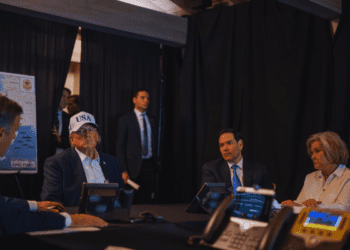OTTAWA, ON + WASHINGTON, DC (July 10, 2025):
“Rather than engaging in another round of asymmetrical USMCA renegotiation, Canada could push for a Grand Bargain – a more ambitious, comprehensive negotiation that incorporates many unresolved bilateral issues and shared opportunities.”
– Hon. Ed Fast
Former Minister of International Trade, Canada, and Distinguished Fellow, Macdonald-Laurier Institute
The United States and Canada need a “Grand Bargain” to reset their relationship and unlock North America’s potential, according to a major new report from the Center for North American Prosperity and Security (CNAPS) and the Macdonald-Laurier Institute.
This introductory paper argues that the crisis in US-Canada relations presents an unprecedented opportunity to forge a transformative agreement that goes far beyond traditional trade deals.
“The relationship between Canada and the United States is at its lowest point since the late 19th century,” said co-authors Richard Shimooka, Tim Sargent, and Jamie Tronnes. “But this crisis also creates the conditions for a historic reset that could benefit both countries for generations.”
The Grand Bargain project proposes a comprehensive pact organized around three pillars, each of which will be elaborated on in dedicated papers:
- North American Energy Dominance – streamlining regulations to unleash Canada’s vast energy resources to meet surging US demand, particularly from AI and electrification.
- Fortress Am-Can – strengthening continental defence through increased Canadian military spending and integrated supply chains.
- North American Prosperity Pact – reframing the economic relationship to recognize Canada as an essential input supplier rather than a competitor.
“This isn’t just another trade agreement,” the co-authors explain. “By broadening the scope to include defense, energy, and security, we create a framework that gives Canada more leverage while providing both countries with the certainty they need to plan for the future.”
The report reveals that two-thirds of Canada’s exports to the US are primary or intermediate inputs – raw materials and components that American companies use to manufacture finished products. This makes Canada fundamentally different from competitors like China, which primarily exports finished goods.
With the mandatory United States-Mexico-Canada Agreement (USMCA) review beginning this summer, the authors argue the timing is perfect for negotiations. The Trump administration has signaled openness to new deals, while Canada’s new Prime Minister Mark Carney campaigned on managing this relationship effectively.
“We have a window of opportunity that may not come again,” said the report’s co-authors. “Both governments need to move past campaign rhetoric and focus on the enormous potential for mutual benefit.”
The report warns that failure to reach a comprehensive agreement could leave both nations vulnerable to economic disruption and security threats. Meanwhile, strategic competitors like China are deepening their alliances with Russia, North Korea, and Iran.
“The bottom line is that America needs ‘more Canada’ – not less,” said the authors. “This Grand Bargain framework shows how both countries can prosper together while strengthening North America’s position in an increasingly dangerous world.”
Canada is breaking its word to Indigenous peoples, and it’s costing everyone. In his new paper for the Macdonald-Laurier Institute, Distinguished Fellow Ken S. Coates shows how the federal government has turned 18th-century treaty promises into a bureaucratic nightmare that traps First Nations in one industry while ignoring billions in economic potential elsewhere.
In 1999, Canada’s highest court ruled that Indigenous communities have the right to earn a “moderate livelihood” from the commercial fishery. However, the two Marshall decisions – the original ruling and a follow-up clarification – had much wider implications: that Indigenous peoples have a treaty right to participate and prosper from the wider Maritime economy.
The trouble is, Ottawa took the easy way out: instead of offering First Nations opportunities to engage in a host of lucrative economic activities, it gave them only one option – to join the commercial fishery. The federal government forced First Nations to buy expensive fishing licences from existing non-Indigenous fishers. Prices skyrocketed – and taxpayers got stuck with the bill.
This narrow-minded choice sparked animosity between non-Indigenous and Indigenous fishers that lingers to this day.
Twenty-five years later, Ottawa’s bureaucrats still control everything, and move at a snail’s pace – for instance, we still don’t have a legal definition of “moderate livelihood” under the Marshall rulings. Meanwhile, Indigenous communities wait for basic economic rights. The current system keeps First Nations beholden to federal bureaucrats who treat them like supplicants begging for permission to exercise rights already guaranteed by the Supreme Court.
The solution is clear: offer First Nations wider options to exercise their Marshall rights across the Maritime economy instead of forcing everyone into fishing. Ottawa should offer compensation to First Nations that do not want to participate in the fishery. Indigenous communities could then invest in a host of industries, from hotels, airlines, farming, mining, and more.
First Nations signed treaties promising participation in the broader economy, not confinement to one industry. It’s time Canada honoured these agreements instead of forcing everyone into boats, Coates writes.
Without major reform, ongoing Indigenous court challenges could paralyze Maritime economic development for decades. Canada must choose: honour the true intent of the treaties, or watch the Maritime economy sink under the weight of its own contradictions.
To learn more, read the full paper here:
For further information, media are invited to contact:
Dagny Pawlak-Loerchner
Senior Communications Officer
613-482-8327 x113
dagny.pawlak-loerchner@macdonaldlaurier.ca







